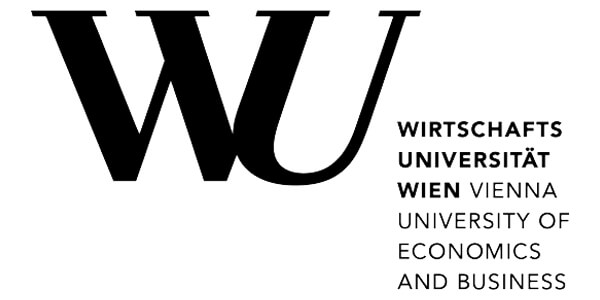Information Systems
- Abschluss: Master of Science (M. Sc.)
- Umfang: 4 Semesters, 120 ECTS Punkte
- Studienart: Präsenzstudium, Vollzeit
- Bildungsfeld: Engineering, Technik & IT
- Unterrichtssprache: Englisch
- Website: www.wu.ac.at

The Master in Information Systems provides students with IT-related knowledge and skills with a particular emphasis on management and research topics. A well-balanced mix of theory and practice and the inclusion of state-of-the-art research findings give graduates the tools they need to question standard practices and develop innovative solutions.
The program follows the European “Design Science” approach: using Information Systems technology to actively improve the way companies conduct their business. Students learn to use modern information technologies to shape business processes according to IT’s potential and to optimize business information systems to meet business demands.The curriculum allows students to individualize their studies, and encourages them to reflect on what they have learned in a holistic context. Working independently and accepting responsibility for their work are additional important skills.
The Master in Information Systems was designed together with a board of leading Austrian stakeholders from industry and government to meet today’s challenges and to give a solid basis for tomorrow’s demands. After graduation, students are qualified for a wide spectrum of careers. Some of our graduates choose to become analysts and managers in IT departments of large companies, others excel as specialists in IT firms (hardware, software, services), some focus on business consulting or decide to found their own start-up companies.
NATIONS WORLDWIDE!
Additonally: Gender balance in an internationally sought-after program!
We are happy to announce new insights into our 2017 master student cohort. Over the course of the last years, the degree of internationality steadily increased. This year it reached an all-time high of 19 nations worldwide! Evidently, our master program is sought after not only in Europe, but also internationally. As the IT sector is generally dominated by men, we always encourage more women to enter the field of IT, thus applying to our program. Do you feel addressed? You will be in great company, as with this year we have reached a balanced gender ratio of 53% female/ 47% male.
SPECIALIZATIONS & COMPETENCE AREAS
Follow your areas of interest
Specialization options early in the program give students sufficient time to acquire profound specialist knowledge. The wide selection of available electives gives students the opportunity to acquire a well-rounded education in the field of information technologies. You choose two IT-Specializations or one IT-Specialization and two Competence Areas.
PLACES PER YEAR
An exclusive, specialized program
A rigorous selection process and our highly qualified faculty ensure the highest quality standards. Hence, students experience learning in small teams with various opportunities to work closely with other students and faculty members.
Structure & Content
The curriculum for the master program in Information Systems ensures that students acquire a well-balanced mix of theoretical and practical knowledge. It consists of twelve compulsory core courses (common body of knowledge) and several elective blocks, including three IT specializations and four competence fields.
The first year provides the basic knowledge mandatoryfor all students. It covers IT/business alignment aspects as well as Information Systems management and Information Systems development aspects. Building on this foundation, the second year of studyoffers a selection of IT specializations. Each studentchooses one IT specialization and either a second ITspecialization or two of the competence areas.
Weitere Informationen findest du hier.
Application & Admission
To enroll in the Master Program in Information Systems, candidates must have completed a bachelor or equivalent first-degree program in a relevant subject at a recognized post-secondary educational institution in Austria or abroad. We are looking for ambitous international and national students with outstanding qualifications and excellent social skills.
Weitere Informationen findest du hier.
Career Prospects
Possible professional applications include but are not limited to
- Information Systems Development:
Designing, developing and launching business application systems, e.g. based on internet technologies. - Research:
Theoretical and applied research on new forms of designing and using information technologies. - Business consulting:
User support in product planning, implementation and product use, as well as planning and holding training sessions. - Marketing:
Marketing innovative hardware and software products.
Qualification Profile
After completion of the program, graduates should be able to:
- Analyze the design of IT systems (particularly business information systems) from various perspectives, transfer development and improvement potential into technically and economically well-founded decisions, and critically analyze and evaluate these decisions
- Have the skills to plan, design, coordinate and implement IT-supported business processes (taking modern information techniques, ergonomic and legal aspects as well as economic restrictions into account)
- Create long-term, sustainability-oriented concepts for the development of information systems. This includes developing system architecture, delineating information subsystems, and determining the demand for new IT systems or for changes to existing systems; this also includes for example evaluating the potential or effects of IT systems in everyday use (mobile systems, integrated systems, geoinformatics systems, etc.)
- Implement system development projects, working alone or in a team, depending on the size of the project, using strongly or loosely structured (agile) IT process management techniques
- Support end users with IT systems-related problems and compensate skills deficits using IT-supported knowledge management methods or targeted training
- Communicate even complex issues and problem cases understandably and appropriately to both experts and laypeople
- Follow and evaluate the current development of knowledge and approaches in the field of information systems from a variety of sources (scientific publications, databases, journals, etc.), and continually develop personal skills and competence in the sense of life-long learning
UNI-Profil
Wirtschaftsuniversität Wien
Welthandelsplatz 1, 1020 Wien
Telefon: 01 313 36-0 Website: www.wu.ac.at
